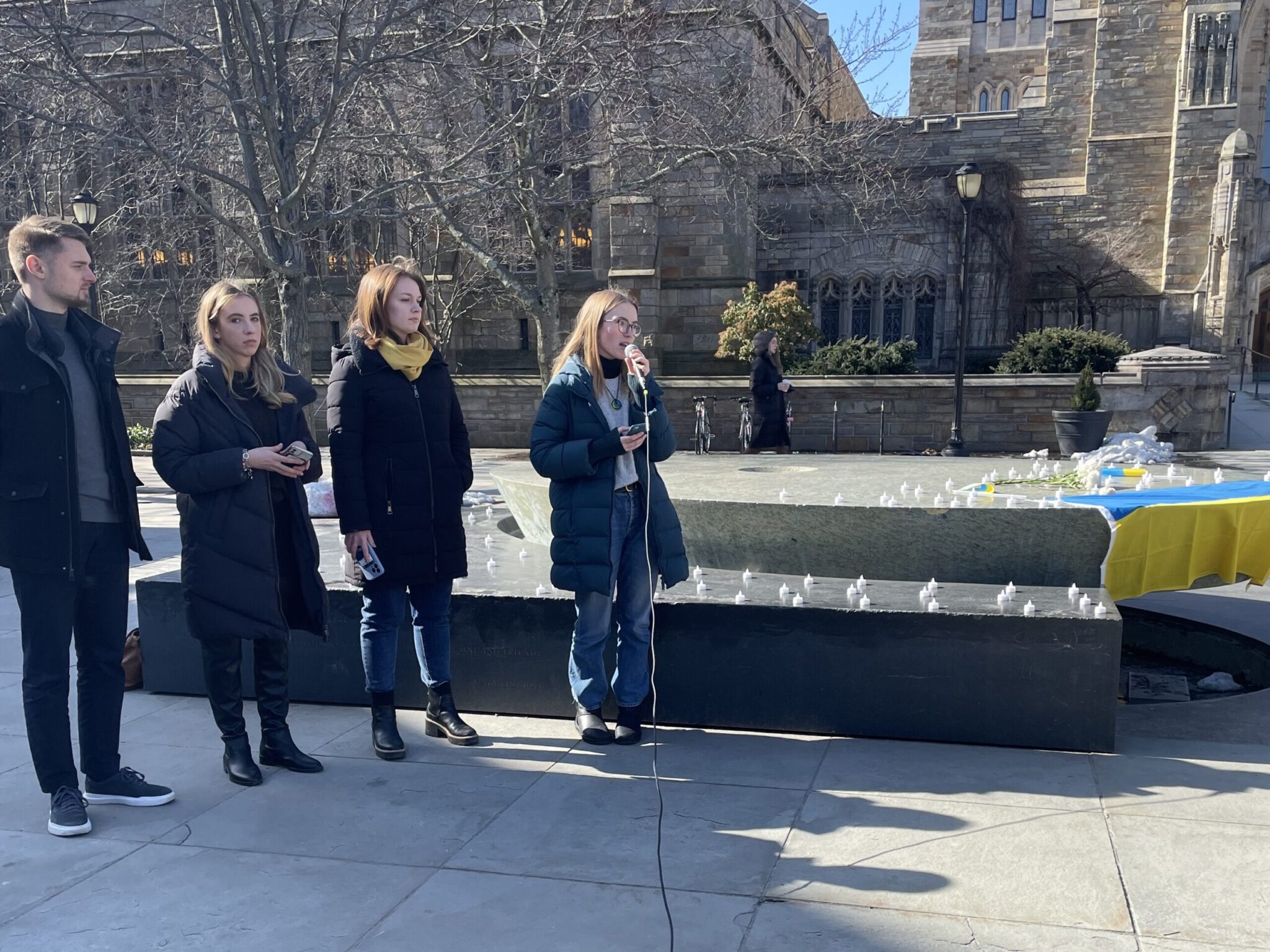At vigil, Ukrainian students urge continued support for Ukraine
To mark the second anniversary of Russia’s full-scale invasion of Ukraine, students from the Ukraine House held a vigil on Feb. 24. The vigil honored the victims of the Russian invasion, as well as those who continue to support Ukraine’s resistance.

Nora Moses, Contributing Photographer
Ukrainian students spoke about the necessity of continued support for Ukraine at a vigil on Saturday to mark the second anniversary of Russia’s full-scale invasion.
About 60 people attended the vigil, which was organized by students from the Ukraine House at Yale. As people gathered at Cross Campus, organizers placed the Ukrainian flag, flowers and candles on the Women’s Table. The vigil featured speeches by Ukrainian students, a moment of silence and a prayer for peace.
“Ukrainians are tired of war, but we do not have an option of ignoring it,” Ukraine House President Daria Valska ’26 said at the vigil. “We cannot pretend it doesn’t exist because it’s not on the front pages anymore. So today I ask you to keep supporting Ukraine, as the war is still as present as it was two years ago.”
Valska told the News that the main goal of the event was to commemorate the victims of Russia’s attacks, but also to thank the people supporting Ukraine’s resistance — “first and foremost, the Ukrainian soldiers,” Valska said.
At the event, Valska also spoke about the importance of continued support for Ukrainian resistance to Russia. She explained that for many Ukrainian people, the conflict began 10 years ago with the Russian annexation of Crimea.
Christina Logvynyuk ’25, a Ukrainian American who has family in Ukraine, also spoke about her experience learning about the invasion of Ukraine and constant fear for her peers there.
“The next few days [after the invasion] were spent in a nightmarish state,” Logvynyuk said. “I was afraid to go to sleep at night out of fear that I would wake up to more mass casualties and rubble. So I would wait to go to sleep at least until the sun rose over Ukraine. That way I knew it had made it another day.”
Logvynyuk shared her translation of a poem by Victoria Amelina, a Ukrainian writer, titled “The Losses of the Ukrainian Army.” The poem describes different people killed in the war and emphasizes the personal nature of the losses beyond public casualty counts. Russian forces killed Amelina in June 2023 during their attack on Kramatorsk.
The next speaker was Yevheniia Podurets ’26, a student who grew up in Kherson, Ukraine. Podurets spoke about how the war has made her feel “like [her] childhood and life before has forever exploded.”
The southern city of Kherson was the first Ukrainian city to fall to Russian control. In November 2022, Ukrainian forces liberated the city. Now, Kherson remains at the forefront of Russia’s offensive and the city has been widely abandoned, with buildings destroyed and streets filled with broken glass.
Podurets also said that anyone who believes in the right to freedom should support Ukraine as “that’s the ultimate way to support freedom today.”
“It’s about staying true to your beliefs and who you are. It’s about carrying a Ukrainian flag under the Russian occupation even if you’ll receive death threats for that,” Podurets said.
Ultimately, for Podurets, freedom is about living “in the way that you want to.”
After Podurets, Oleksii Antoniuk ’24 thanked attendees for “stay[ing] committed” to the cause at a time when many people are fatigued.
Logvynyuk urged students to continue to check in with their Ukrainian peers, saying that she “wouldn’t have been able to get through these last two years” without the support of her non-Ukrainian friends.
“Of course, donating is great, but those personal connections, supporting your friends — you truly don’t know what that means to a lot of us,” she said
In the final student speech, Daria Figlus ’26 urged students to advocate for their representatives to continue sending aid to Ukraine.
On Feb. 12, the Senate passed a bill with $95 billion in aid for Ukraine. The bill faces opposition in the House of Representatives, with House Speaker Mike Johnson, R-La., refusing to put forward the legislation due to pressure from fellow Republicans.
“We need your help. Talk to your representatives, vote for the representatives. Write to them. You have a voice here. This is America, a democracy. You have a voice,” Figlus said. “We need them to give us weapons and humanitarian aid. We need help. So speak up. Donate to Ukrainian organizations.”
The Ukraine House at Yale was founded in September 2021.







